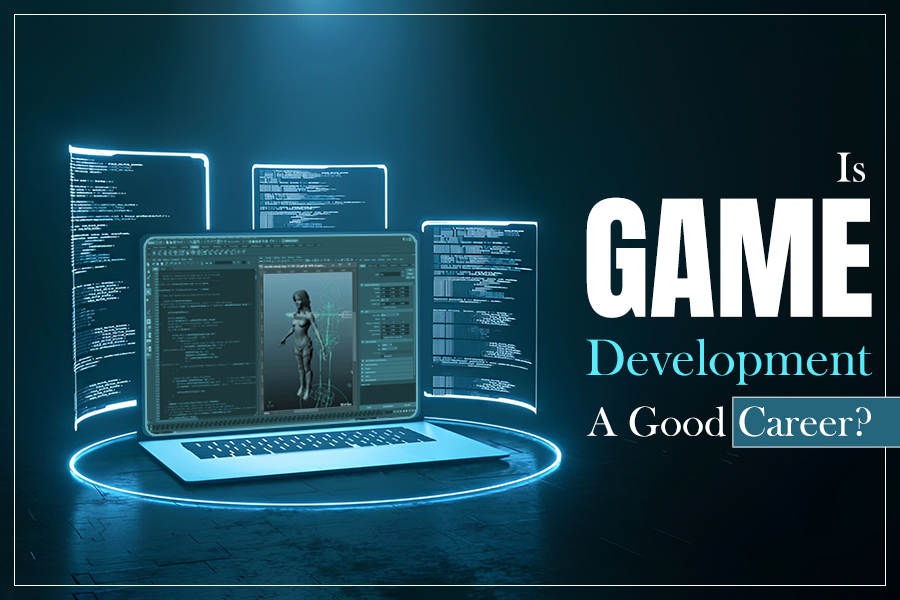
Game development has emerged as a flourishing industry. It is intriguing to the fantasies of millions of participants globally. The technological evolution, and rising popularity of video games, have created various opportunities for aspiring game developers. However, before venturing into a career, it’s crucial to understand the complexities of this dynamic field.
In this short guide, we will explore the world of game development as a potential career path. We will explore industry skills, roles, challenges, and rewards of game development.
This guide aims to provide a comprehensive overview of game development as a career.
The gaming industry is a captivating one and thrives with opportunities. We’ll offer our guidance to help you discern if game development is the right choice for you or not.
Game Development- What is it?
Game development is a multidisciplinary approach encompassing various aspects of creating video games. It involves game designing and development for various platforms, including laptops, game consoles, mobile devices, and more.
Game developers work collaboratively in teams to bring virtual worlds to life. The developers combine their creative and technical skills to craft hypnotic and interactive experiences.
This industry is constantly growing. It is driven mainly by technological advancements, changing player preferences, and market trends. There are several career opportunities, including game designer, programmer, artist, animator, sound designer, producer, etc.
However, game development is a highly competitive field that demands originality, technical mastership, problem-solving capabilities, and teamwork.
An Overview of the Gaming Industry
The gaming industry has various forms of entertainment. It includes video games, mobile games, console games, desktop games, cloud games, artificial intelligence-driven games, etc.
It has experienced tremendous growth and innovation, becoming a major force in the global entertainment landscape. Here’s our perspective of the gaming enterprise in a nutshell-
• Market Size and Revenue
The gaming industry has emerged as one of the largest and most profitable entertainment industries worldwide. In recent years, it has surpassed the revenue generated by the film and music industries. According to industry reports, the global gaming market valuation was over $160 billion in 2020. It will continue growing.
• Platforms and Distribution
Gaming has now expanded beyond traditional platforms like consoles and PCs. Mobile gaming has become increasingly popular, driven by the widespread adoption of smartphones and tablets. Digital distribution platforms and mobile app stores have revolutionized how they are distributed and accessed by players.
• Esports
Esports and other competitive video games have witnessed remarkable growth in the gaming industry. Professional gamers compete in organized tournaments and leagues, attracting massive audiences. Esports events now have massive power to fill stadiums and generate millions of viewership hours.
• Virtual Reality (VR) and Augmented Reality (AR)
VR and AR technologies have gained huge traction in the gaming industry. They now offer immersive experiences and new ways to interact with games. VR headsets and PlayStation VR have opened up new possibilities. AR games, like Pokémon Go, have demonstrated the potential of blending virtual and real-world environments.
• Online Gaming and Live Services
The rise of high-speed internet connectivity has fostered the growth of online gaming. Multiplayer games, massively multiplayer online role-playing games (MMORPGs) like Elden Ring, and battle royale games like PUBG or Call of Duty have become highly popular.
Additionally, game developers now focus on “live services,” providing regular updates, expansions, and in-game purchases to keep players engaged and monetize their products over the long term.
• Independent Game Development
Independent game development has also gained prominence, thanks to digital distribution platforms and crowdfunding. Indie games, often created by small teams or individuals, have found critical acclaim and commercial success. These games often explore unique concepts, artistic styles, and gameplay mechanics.
• Cloud Gaming
Cloud gaming is another promising technology allowing players to stream games over the internet without needing powerful hardware. Services, like Google Stadia, Microsoft xCloud, and NVIDIA GeForce Now enable players to access games on various devices.
• Social and Community Aspects
Gaming has become a social activity, with online communities, social networks, and streaming platforms like Twitch. It enables players to connect, share experiences, and watch others play. Influencers and streamers have gained significant influence. They have become an essential part of game marketing and promotion.
• Technological Advancements
Game designers continually push technological boundaries. Graphics have become increasingly realistic, with advancements in hardware and software. Game developers and designers utilize progressive techniques to create phenomenal products. Techniques like using ray tracing and machine learning to enhance visual fidelity and create more immersive experiences.
• Cultural Impact
Gaming has become integral to popular culture, influencing movies, TV shows, music, and fashion. You must have observed how games have expanded their storytelling capabilities, often delivering rich narratives and memorable characters. Gaming events and conventions, like E3 and Gamescom, now attract millions of attendees, generating significant media coverage.
By and large, the gaming industry continues to evolve and innovate. It is adopting new technologies, business models, and forms of entertainment. With the advent of emerging technologies like VR, AR, and cloud gaming, the future of gaming looks promising. It will be offering more immersive and engaging experiences for players worldwide soon.
Is Game Development a Good Career to Pursue?
There might be questions like, “Is game development a good career choice?” when looking for one in the game development sector. Game development is an exciting and rewarding career path. It offers a multitude of opportunities for individuals passionate about technology and creative expression.
Here are some reasons why game development can be a great career to pursue-
• Creativity and Artistic Expression
For creative thinkers, game development provides a platform for artistic individuals to bring their ideas to life. It combines inventive elements like storytelling, character design, world-building, and visual aesthetics with interactive gameplay mechanics. They allow developers to express their unique visions and create immersive experiences for players. So you may want to take a chance in this field.
• Collaboration and Teamwork
Game development is typically a collaborative process that involves working in interdisciplinary teams. Developers collaborate with artists, designers, sound engineers, and other professionals to create cohesive and engaging games. This fosters a dynamic and supportive work environment where teamwork and effective communication are essential skills to master.
• Technological Advancements and Innovation
The gaming industry is at the forefront of technological advancements. There is room for innovation and pushing boundaries, welcoming new technologies and methods. By taking this career you can enhance graphics, audio, artificial intelligence, virtual reality, and more. This constant drive for innovation creates opportunities for developers to learn and work with cutting-edge tools and platforms.
• High Demand and Job Opportunities
Let’s come to the most important point. The demand for skilled game developers continues to rise. Video games’ popularity boosts job opportunities in programming, design, art, sound, production, and quality assurance. Isn’t this a great reason to pursue a game development career? Think about it.
• Career Diversity and Specialization
Game development offers a diverse range of career paths and specializations. There are various avenues to explore within the industry. You can find interest in programming, 3D modeling, level design, animation, sound engineering, game testing, or project management. This allows individuals to focus on their specific areas of interest and develop expertise in their chosen fields.
• Entrepreneurial Opportunities
The rise of independent game development and digital distribution platforms has opened doors for entrepreneurial game developers. Individuals can create and release their games with the right skills, creativity, and determination. They can do it by bypassing traditional publishing channels and reaching the audience directly.
• Global Reach and Impact
Video games have a global reach and can touch the lives of millions of players. You have the opportunity to create experiences that entertain, educate, and inspire people from diverse backgrounds as game developers. Gaming contests can evoke emotions and convey powerful narratives. It connects and engages with audiences on a profound level.
• Personal and Professional Growth
As technology advances and new trends emerge, developers must adapt and acquire new skills to stay competitive. The iterative nature of game development projects also provides opportunities to learn from both successes and failures, fostering personal and professional growth.
Game development presents an exciting blend of creativity, technology, and promising career prospects. It offers the opportunity to transform their love for gaming into a rewarding profession, making a meaningful impact in the constantly evolving realm of interactive entertainment. Although game development comes with challenges and demands, it provides a unique avenue for personal fulfillment and professional growth.
What Are The Skills Required For Game Development?
Game development requires a combination of specific soft and hard skills. If you possess or can develop the following expertise, it could be an ideal career choice-
Programming
To become a game developer, you will need strong programming skills to write code and create the functionality of games. Proficiency in languages like Python, JavaScript, Java, C++, and SQL would be good. You will also need a solid foundation in mathematics and physics for extra benefits. You’ll cover the foundation as a game developer if you have these technical programming skills.
Problem-solving
With immense experience, trust us when we say you will face barriers in every career path. Therefore, the ability to analyze and solve problems is crucial in game development. Developers frequently encounter glitches and bugs that require troubleshooting and rewriting of code. Strong problem-solving skills enable developers to address issues efficiently and improve the overall game development experience.
Gaming Experience
Are you the one who has played hours of video games? A passion for playing games, and an understanding of gaming mechanics engines can greatly benefit game developers. Being a dedicated gamer helps create games that resonate with the target audience and avoid common pitfalls.
Animation
Graphic design and animation play a significant role in game development. Proficiency in animation software and design enhances the gaming experience. It helps create visually appealing and immersive gaming experiences. Familiarity with software such as Adobe Animate, Autodesk Maya, and Blender is often sought after.
Education
While a bachelor’s degree in software engineering or computer science can be advantageous for entry-level positions, educational requirements vary. Some game studios consider accredited online programs to focus on science, mathematics, and physics. Advanced degrees like master’s or postgraduate degrees are beneficial for career advancement.
By cultivating and sharpening these skills, aspiring game developers can position themselves for success in the game development field.
Game Development Career- What’s In Store For You?
The game development domain presents a wide range of career options, each with its own set of duties and expertise. There are several game development courses online that could help you significantly. Here are some key roles that you should look forward to for an amazing career in game development-
Game Designer
Game designers are responsible for creating the overall concept, gameplay mechanics, and rules of a video game. They design levels, puzzles, content, characters, and narrative elements to ensure an engaging and immersive player experience. Game designers often work closely with artists, programmers, and other team members to bring their vision to life.
Gaming Artist
Game artists are responsible for the visual elements of a game. They create concept art, character designs, environments, objects, and visual effects that bring the game world to life. Game artists utilize various tools and software to design and create visually appealing and cohesive aesthetics.
Gaming Programmer
Game programmers are responsible for coding and making it functional as intended. They develop the underlying systems, mechanics, and functionalities that power the game. Programmers use programming languages such as C++, Java, or Python to implement gameplay features, artificial intelligence, physics simulations, networking, and user interfaces.
Sound Engineer
Sound engineers focus on devising and executing the audio elements of a game. They design and mix sound effects, ambient background sounds, music, and voice-overs to improve the player’s immersion and overall gaming experience. Sound engineers work closely with designers and artists to ensure the audio elements align with the game’s atmosphere and narrative.
Game QA Tester
Game testers, also known as quality assurance testers, play a crucial role in ensuring the quality and functionality of a game. They identify and report bugs, glitches, and usability issues by thoroughly testing the game’s mechanics, levels, and features. Game testers play a vital role in providing valuable feedback for the development team to improve the game’s performance and overall player experience.
Level Designer
Level designers focus on creating engaging and well-paced gameplay experiences by designing levels and challenges within a game. They determine the layout, obstacles, puzzles, and difficulty progression to keep players engaged and motivated. Level designers work closely with game designers and artists to ensure that the gameplay and visual elements align seamlessly.
Producer
Game producers oversee the development process and ensure that projects are completed on time and within budget. They coordinate teams, manage resources, handle contracts, and oversee marketing initiatives. Producers act as a bridge between different departments and stakeholders to ensure effective communication and successful project delivery.
It’s worth noting that many game developers specialize in multiple roles or possess a combination of skills. The field offers a dynamic and collaborative environment. Individuals can leverage their creativity, technical expertise, and passion for gaming contributing to creating mesmerizing and satisfying gaming experiences.
Career In Game Development- The Challenges You May Face
Every career has its pros and cons. We have seen many students pursue something they love, yet fail in it due to other reasons. So let us throw some light on the challenges you may face in a game development profession
• Technical Complexity
Game development involves working with complex software tools, programming languages, and frameworks. As a game developer, you’ll need to constantly stay updated with the latest technologies and trends to create engaging and innovative games. The rapid advancement of technology can make it challenging to keep up with the ever-evolving landscape.
• Team Collaboration
Game development is a collective operation that requires effective teamwork. Working with artists, architects, programmers, and other specialists can be difficult as everyone has different perspectives and priorities. Communication and coordination are crucial for a successful game development project. Managing diverse personalities and skill sets can be a substantial challenge.
• Tight Deadlines
The game industry is known for its demanding schedules and tight deadlines. Game development projects often have strict release dates, and meeting those deadlines can be stressful. Balancing quality and time constraints can be hard, especially when random issues or technical hurdles arise. You have to be prepared for it.
• Creative Pressures
Coming up with fresh and unique ideas every time can be tough. The industry is highly competitive. Standing out in a crowded market requires innovative thinking. Additionally, creative disparities within the team or constraints imposed by funding and technology can pose further challenges to your creative vision.
• Quality Assurance
Ensuring the quality of a game is a significant challenge in the development process. Testing and debugging games to find and fix issues can be a time-consuming and meticulous task. As games become more complex, the number of potential bugs and glitches increases, requiring thorough testing across various platforms and devices.
• Market Saturation
The game market is saturated with several games, making it difficult to get noticed. Standing out, especially for indie developers or smaller studios with limited marketing budgets can be tough. Building a fan base, attracting players, and generating revenue can be a significant hurdles in a competitive marketplace.
• Crunch Culture
The game industry has been notorious for its “crunch culture,” where developers work long hours, often under high pressure, to meet deadlines. This can lead to burnout, decreased productivity, and a negative work-life balance. While efforts are being made to address this issue, it remains a challenge that game developers may face.
• Monetization and Business Considerations
Creating games is not just about development; it also involves comprehending the business side of the industry. Effective game marketing, distribution, marketing, advertising, and budget management are crucial for independent developers and small studios.
Despite these challenges, a career in game development can be highly rewarding. By staying adaptable, continuously learning, and being passionate about your craft, you can overcome these obstacles and thrive colourfully.
How To Launch A Career in Gaming?
Launching a career in gaming requires a combination of passion, skills, and strategic planning. You need to think many times before taking this huge step. You may face confusion and blurry moments in the process too. We’ll help you with some steps so that you are well-prepared-
• Have a Definitive Goal
You need to have clarity in pursuing such a career. Try determining what specific area of the gaming industry you want to follow. Game development, game design, game art, game testing, or game marketing are just a few of the many career paths available. From what we have seen, you should identify your interests and strengths first; it will help you focus on your efforts.
• Build Relevant Skills
To start, you have to have basic skills to achieve. Hence, acquire the necessary skills and knowledge for your chosen career path. This may involve learning programming languages, honing artistic abilities, studying game design principles, or gaining marketing and business skills. Take advantage of the best game development courses online, workshops, and other educational resources to develop your skills.
• Get Practical Experience
You must look for opportunities to gain practical experience in the gaming industry. This could involve part-time jobs, internships, or volunteering at game development studios, indie game projects, or game-related events. Practical experience will help you develop your skills further, build your network, and make your resume more appealing to potential employers. It will also help create a perfect portfolio which will be our next point.
• Make a Portfolio
We don’t just speak for a game development career, but for every job you apply for prepare a portfolio. Build one that showcases your work and demonstrates your abilities. If you’re interested in game development or design, create small game projects or design concept documents to showcase your creativity and problem-solving skills. For artists, they can create an online portfolio showcasing their artwork, including character designs, environments, or animations.
• Networking
We know networking may seem a cumbersome task but it is essential to move forward. You can do it by attending game development conferences, workshops, and industry events to meet professionals in the field. Join online forums and communities where you can connect with fellow game enthusiasts and industry experts. Networking leads to mentorship opportunities, job referrals, and valuable insights into the industry.
• Build an Online Presence
We all know this is the peak digital era. Today, most of the population thrives on online products and services. So, establish an online presence to showcase your work and connect with the gaming community. Having a professional website or blog where you can share your projects, insights, and industry-related articles would be good. Try to engage with other game developers, designers, and artists on social media platforms and join relevant online communities. It will be helpful to have a great career launch.
• Apply for Entry-Level Positions
Whether you apply for a Unity 3D game development career or a game software engineer job, various companies will need freshers to do certain tasks. Begin applying for entry-level positions in the gaming industry. Look for job openings at game development studios, game publishing firms, or other game-related firms. It may take time, hence, do not be discouraged if you don’t land your dream job right away; gaining experience and building a network in the industry is a valuable stepping stone.
• Continuously Learn and Adapt
Change is the natural course of nature. So one must adapt to new things. The gaming industry is dynamic and constantly evolving. Stay updated with the latest trends, technologies, and practices in the selected field. Try to improve your skills continuously. You have to learn and be adaptable if there are feedback and criticism. This attitude is necessary for the changing industry demands and a swift launch to your career.
• Be Persistent and Resilient
Let’s face it, things can become super competitive and dark in any career. Landing a job in gaming can be challenging. Be prepared for ample rejection and setbacks, but don’t give up. Stay persistent, keep refining your skills, and embrace opportunities for growth and learning.
Launching a career in gaming requires commitment, perseverance, and enthusiasm to learn. By following these steps and staying passionate about your craft, you can increase your chances of success in the exciting world of gaming.
Level Up Your Career: Become A Successful Game Developer
Pursuing a career in game development offers tremendous opportunities for growth and creativity. You can have a fulfilling journey in this vibrant industry by combining dedication, continuous learning, and a strategic approach. Whether you create innovative games or design unforgettable experiences, the key lies in honing your skills. Adapt to the ever-evolving nature of the field.
If you are looking for a perfect institute, Webskitters Academy is the one for you. With experienced faculty, industry-oriented module, and real-time project work, you get everything.
So, level up your game development career, where your mind knows no bounds and the possibilities are infinite. With our renowned institute, step onto a thrilling adventure in the gaming landscape. The game is on!
Search
I Want to Learn...
Category
Explore OurAll CoursesTransform Your Dreams
into Reality
Subscribe to Our Newsletter
"*" indicates required fields
 Course Fees Revising Soon! to Lock in the Current Price
Course Fees Revising Soon! to Lock in the Current Price 





